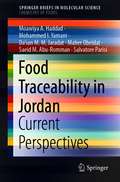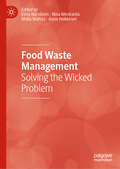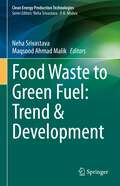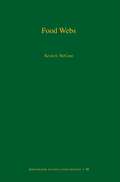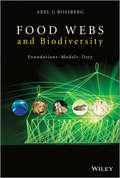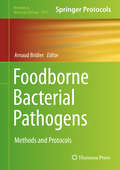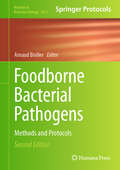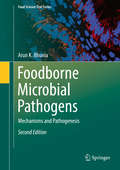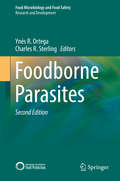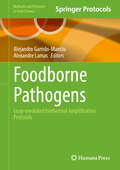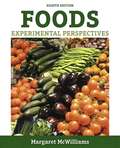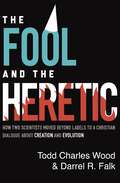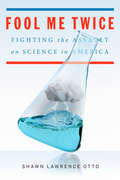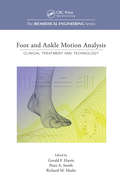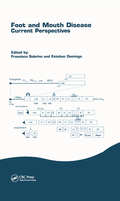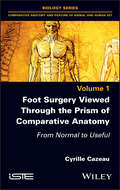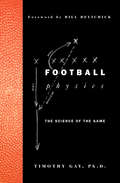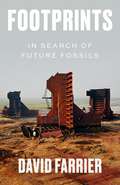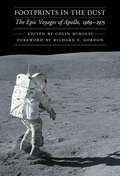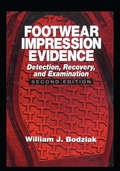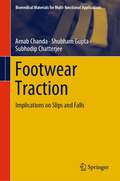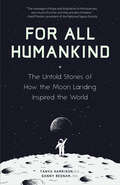- Table View
- List View
Food Traceability in Jordan: Current Perspectives (SpringerBriefs in Molecular Science)
by Moawiya A. Haddad Mohammed I. Yamani Da'san M.M. Jaradat Maher Obeidat Saeid M. Abu-Romman Salvatore ParisiThis book outlines the evolution of food traceability matters in the current traditional foods market and particularly with regard to selected historical foods based in Jordan.At present, traceability is just one of the many requirements the food industry is forced to meet. The topic can be approached from various angles: regulation, technological perspectives, food business operators, packaging manufacturers, software producers, and consumer views. In addition, traceable food products provide an interesting legacy for many geographical and ethnic cultures. Consequently, the examination of certain recipes or food products linked with history and traditions can make a unique and valuable contribution to future developments in this area.In this regard, Jordanian foods offer a prime example. This book examines three traditional products from different viewpoints, paying special attention to their chemical composition, the identification of raw materials, preparation procedures, and traceability. The book begins with a more general discussion on food traceability without detailed regional implications, while the second chapter discusses the product hummus in its many versions. In turn, the third and fourth chapters focus on two fermented dairy products, labaneh and jameed, and their connections with the Mediterranean diet. The book offers a valuable reference guide to many traditional/historical products in the Middle East, with a particular focus on traceability matters and solutions.
Food Waste Management: Solving the Wicked Problem
by Elina Närvänen Nina Mesiranta Malla Mattila Anna HeikkinenThis book focuses on the crucial sustainability challenge of reducing food waste at the level of consumer-society. Providing an in-depth, research-based overview of the multifaceted problem, it considers environmental, economic, social and ethical factors. Perspectives included in the book address households, consumers, and organizations, and their role in reducing food waste. Rather than focusing upon the reasons for food waste itself, the chapters develop research-based solutions for the problem, providing a much-needed solution-orientated approach that takes multiple perspectives into account.Chapters 1, 2, 12 and 16 of this book are available open access under a CC BY 4.0 license at link.springer.com
Food Waste to Green Fuel: Trend & Development (Clean Energy Production Technologies)
by Neha Srivastava Maqsood Ahmad MalikThis edited book covers all the existing possibilities of using food waste as a potential, alternative and ‘ready to use’, feed stock for biofuels production. Moreover, it also presents all the sustainable and economically feasible biofuels option with their details strategies, mechanism, advantages, draw backs and future scope. It also explores in depth knowledge of food waste, and details the processing as well as opportunities to utilize it at for mass scale biofuels production. The practical feasibility and economic sustainability of biofuels production is still suffering with its cost intensity and lack of rigorous scientific strategies as well as inputs to explore it on further at upscale level. Low cost, carbon rich, economic and environmental friendly feedstock, may have strong possibilities to reduce the overall biofuels production cost and the book is based on this strategy. The book is of interest to academicians and researchers interested in industries related to biofuels production, food processing industries and industries related to waste valorization.
Food Webs (Monographs in Population Biology #50)
by Kevin S. McCannHuman impacts are dramatically altering our natural ecosystems but the exact repercussions on ecological sustainability and function remain unclear. As a result, food web theory has experienced a proliferation of research seeking to address these critical areas. Arguing that the various recent and classical food web theories can be looked at collectively and in a highly consistent and testable way, Food Webs synthesizes and reconciles modern and classical perspectives into a general unified theory. Kevin McCann brings together outcomes from population-, community-, and ecosystem-level approaches under the common currency of energy or material fluxes. He shows that these approaches--often studied in isolation--all have the same general implications in terms of population dynamic stability. Specifically, increased fluxes of energy or material tend to destabilize populations, communities, and whole ecosystems. With this understanding, stabilizing structures at different levels of the ecological hierarchy can be identified and any population-, community-, or ecosystem-level structures that mute energy or material flow also stabilize systems dynamics. McCann uses this powerful general framework to discuss the effects of human impact on the stability and sustainability of ecological systems, and he demonstrates that there is clear empirical evidence that the structures supporting ecological systems have been dangerously eroded. Uniting the latest research on food webs with classical theories, this book will be a standard source in the understanding of natural food web functions.
Food Webs and Biodiversity
by Axel G. RossbergFood webs have now been addressed in empirical and theoretical research for more than 50 years. Yet, even elementary foundational issues are still hotly debated. One difficulty is that a multitude of processes need to be taken into account to understand the patterns found empirically in the structure of food webs and communities. Food Webs and Biodiversity develops a fresh, comprehensive perspective on food webs. Mechanistic explanations for several known macroecological patterns are derived from a few fundamental concepts, which are quantitatively linked to field-observables. An argument is developed that food webs will often be the key to understanding patterns of biodiversity at community level. Key Features: Predicts generic characteristics of ecological communities in invasion-extirpation equilibrium.Generalizes the theory of competition to food webs with arbitrary topologies.Presents a new, testable quantitative theory for the mechanisms determining species richness in food webs, and other new results.Written by an internationally respected expert in the field. With global warming and other pressures on ecosystems rising, understanding and protecting biodiversity is a cause of international concern. This highly topical book will be of interest to a wide ranging audience, including not only graduate students and practitioners in community and conservation ecology but also the complex-systems research community as well as mathematicians and physicists interested in the theory of networks. "This is a comprehensive work outlining a large array of very novel and potentially game-changing ideas in food web ecology."Ken Haste Andersen, Technical University of Denmark "I believe that this will be a landmark book in community ecology ... it presents a well-established and consistent mathematical theory of food-webs. It is testable in many ways and the author finds remarkable agreements between predictions and reality."Géza Meszéna, Eötvös University, Budapest
Foodborne Bacterial Pathogens: Methods and Protocols (Methods in Molecular Biology #1918)
by Arnaud BridierThis volume presents a compilation of various representative techniques and approaches currently used to study bacterial foodborne pathogens. Chapters guide the reader through bacterial pathogen detection and quantification in food, molecular, phenotypic, metabolic characterization of food pathogens, and ecology of foodborne bacterial pathogens. Written in the highly successful Methods in Molecular Biology series format, chapters include introductions to their respective topics, lists of the necessary materials and reagents, step-by-step, readily reproducible laboratory protocols, and tips on troubleshooting and avoiding known pitfalls.Authoritative and cutting-edge, Foodborne Bacterial Pathogens : Methods and Protocols aims to server as a guide both for researchers, students, and those in the food industry who want to have an overview of current approaches and protocols used to study bacterial foodborne pathogens.
Foodborne Bacterial Pathogens: Methods and Protocols (Methods in Molecular Biology #2852)
by Arnaud BridierThis updated volume presents a compilation of various representative techniques and approaches currently used to study bacterial foodborne pathogens. Chapters guide the reader through bacterial pathogen detection and quantification in food, molecular, phenotypic, metabolic characterization of food pathogens, and ecology of foodborne bacterial pathogens. Written in the highly successful Methods in Molecular Biology series format, chapters include introductions to their respective topics, lists of the necessary materials and reagents, step-by-step, readily reproducible laboratory protocols, and key tips on troubleshooting and avoiding known pitfalls. Authoritative and cutting-edge, Foodborne Bacterial Pathogens: Methods and Protocols, Second Edition aims to ensure successful results in the further study of this vital field.
Foodborne Microbial Pathogens: Mechanisms And Pathogenesis (Food Science Text Ser.)
by Arun K. BhuniaThis book primarily covers the general description of foodborne pathogens and their mechanisms of pathogenesis, control and prevention, and detection strategies, with easy-to-comprehend illustrations. The book is an essential resource for food microbiology graduate or undergraduate students, microbiology professionals, and academicians involved in food microbiology, food safety, and food defense-related research or teaching. This new edition covers the significant progress that has been made since 2008 in understanding the pathogenic mechanism of some common foodborne pathogens, and the host-pathogen interaction. Foodborne and food-associated zoonotic pathogens, responsible for high rates of mortality and morbidity, are discussed in detail. Chapters on foodborne viruses, parasites, molds and mycotoxins, and fish and shellfish are expanded. Additionally, chapters on opportunistic and emerging foodborne pathogens including Nipah virus, Ebola virus, Aeromonas hydrophila, Brucella abortus, Clostridium difficile, Cronobacter sakazakii, and Plesiomonas shigelloides have been added. The second edition contains more line drawings, color photographs, and hand-drawn illustrations.
Foodborne Parasites
by Ynés R. Ortega Charles R. SterlingThe globalization and commercialization of the food system has unintentionally led to the introduction of new foodborne parasites in countries worldwide. Fortunately, advances in detection and control are providing the basis for a better understanding of the biology and control of parasitic infections, and this in turn will likely contribute to the reduction and hopefully elimination of parasitic foodborne outbreaks. Building on the first edition, this completely revised second edition of Foodborne Parasites covers the parasites most associated with foodborne transmission and therefore of greatest global public health relevance. The volume examines protozoa and their subgroups: the amoeba, coccidia, flagellates and ciliates. Chapters also address Trypanosoma cruzi, recently recognized as an emerging foodborne protozoan. The helminth section is expanded to cover teniasis, cysticercosis, hydatidosis, and the trematodes and nematodes including Angiostrongylus, which is present worldwide. Finally, the editors examine the burden and risk assessment determinations that have provided a scientific framework for developing policies for the control of foodborne parasites.
Foodborne Pathogens: Loop-mediated Isothermal Amplification Protocols (Methods and Protocols in Food Science)
by Alejandro Garrido-Maestu Alexandre LamasThis volume details reliable protocols for the successful implementation of LAMP assays for the detection of the most relevant foodborne pathogens and antibiotic resistance microorganisms. Chapters guides the reader through different types of detection strategies, from the most classical ones to the most recent ones focused on color change or even the implementation of nanomaterials are covered, along with specific applications in point-of care devices and even primer design. Written in the format of the Methods and Protocols in Food Science series, chapters list necessary materials and methods for readily reproducible protocols. Authoritative and cutting-edge, Food Bourne Pathogen: Loop-mediated Isothermal Amplification Protocols aims to be comprehensive guide for researchers in the field. Authoritative andcutting-edge, Loop-mediated isothermal amplification: foodborne pathogendetection and characterization aims to provide comprehensive and updated state-of-art methodologies for food analysis.
Foodborne Viral Pathogens (Food Microbiology)
by Peter White Natalie Netzler Grant HansmanViral transmission through contaminated food and water claims hundreds of thousands of lives every year, particularly affecting children in developing nations. Foodborne viral pathogens are associated with gastroenteritis and hepatitis, causing widespread epidemics that affect all populations and demographics worldwide. Foodborne Viral Pathogens comprehensively covers the predominant etiological viral agents of foodborne disease, including norovirus, hepatitis A virus, hepatitis E virus, astrovirus, sapovirus and rotavirus, and several emerging viruses and prions. By improving food safety awareness and viral detection, and through promotion of global food safety standards, our ability to cope with and control foodborne disease will be enhanced. Foodborne Viral Pathogens includes a detailed review of the molecular biology, potential vaccines, and available antiviral treatments of all major foodborne viral pathogens and prions. Written by specialists and leading virologists, this book features techniques used for typing, viral detection, strategies for control, and viral risk assessments. This book is intended as a detailed handbook for food microbiology and medical applications and will be a useful guide for anyone with an interest in foodborne disease.
Foods: Experimental Perspectives
by Margaret McWilliamsPreparing aspiring professionals with clearly written, in-depth scientific coverage of food and its safe preparation. Never before has food received so much attention. Today's news shines a spotlight on food, food science, and nutrition ― beckoning today’s readers to an exciting career in this essential industry. Foods: Experimental Perspectives, Eighth Edition blends the underlying science with discussion of GMOs, sustainability, healthy and trendy food choices, and other current consumer issues. Its clear presentation of the science guides readers through complex concepts that influence practices in food preparation and product development. The study of foods begins with an in-depth presentation of carbohydrates and food sources, followed by a careful look at lipids, and ultimately proteins and their principal sources. Aspects of the food supply, including safety, preservation, and additives are then examined. Discussion of the research process and evaluation techniques used in food research and product development close the text. Professional vocabulary is developed through margin definitions and a substantial glossary, while other learning aids ― chapter objectives, summaries, study questions, "Food for Thought" boxes, and photos ― support the reader's journey through the exciting look at food, food science, and food safety.
Foods That Harm, Foods That Promote Health: A Biochemical and Nutritional Perspective in Health and Disease Prevention
by Stefan A. Hulea AhmadiThis book looks at fresh (fruits and vegetables) and processed foods from a biochemical and nutritional perspective, as well as the relationship between their content in micronutrients and phytochemicals and the major killer diseases such as cardiovascula
The Fool and the Heretic: How Two Scientists Moved beyond Labels to a Christian Dialogue about Creation and Evolution
by Todd Charles Wood Darrel R. Falk Rob BarrettThe Fool and the Heretic is a deeply personal story told by two respected scientists who hold opposing views on the topic of origins, share a common faith in Jesus Christ, and began a sometimes-painful journey to explore how they can remain in Christian fellowship when each thinks the other is harming the church. To some in the church, anyone who accepts the theory of evolution has rejected biblical teaching and is therefore thought of as a heretic. To many outside the church as well as a growing number of evangelicals, anyone who accepts the view that God created the earth in six days a few thousand years ago must be poorly educated and ignorant--a fool. Todd Wood and Darrel Falk know what it's like to be thought of, respectively, as a fool and a heretic. This book shares their pain in wearing those labels, but more important, provides a model for how faithful Christians can hold opposing views on deeply divisive issues yet grow deeper in their relationship to each other and to God.
Fool Me Twice: Fighting the Assault on Science in America
by Shawn Lawrence Otto"Whenever the people are well informed," Thomas Jefferson wrote, "they can be trusted with their own government."But what happens in a world dominated by complex science? Are the people still well-enough informed to be trusted with their own government? And with less than 2 percent of Congress with any professional background in science, how can our government be trusted to lead us in the right direction?Will the media save us? Don't count on it. In early 2008, of the 2,975 questions asked the candidates for president just six mentioned the words "global warming" or "climate change," the greatest policy challenge facing America. To put that in perspective, three questions mentioned UFOs.Today the world's major unsolved challenges all revolve around science. By the 2012 election cycle, at a time when science is influencing every aspect of modern life, antiscience views from climate-change denial to creationism to vaccine refusal have become mainstream.Faced with the daunting challenges of an environment under siege, an exploding population, a falling economy and an education system slipping behind, our elected leaders are hard at work ... passing resolutions that say climate change is not real and astrology can control the weather.Shawn Lawrence Otto has written a behind-the-scenes look at how the government, our politics, and the media prevent us from finding the real solutions we need. Fool Me Twice is the clever, outraged, and frightening account of America's relationship with science—a relationship that is on the rocks at the very time we need it most.
Foot and Ankle Motion Analysis: Clinical Treatment and Technology
by Gerald F. Harris Peter A. SmithHuman motion analysis or gait analysis is used throughout the country and the world in clinics for pre-surgical planning and postsurgical follow-up. Only recently have technological advances truly begun to meet medical needs by supplying more accurate analytical data from which to make educated assessments of dynamic foot and ankle pathology. A com
Foot and Mouth Disease: Current Perspectives
by Esteban Domingo Francisco SobrinoThe shock following the recent outbreak of foot-and-mouth disease (FMD) in the UK dispelled the notion that this disease was permanently under control and could be forgotten. FMD proved to be an endemic disease in many countries and continues to pose a major threat to animal health worldwide. The development of more effective and socially acceptabl
Foot Surgery Viewed Through the Prism of Comparative Anatomy: From Normal to Useful
by Cyrille CazeauComparative anatomy helps to define among surgical procedures, those that are able to restore early walking function using really useful structures, without necessarily respecting the normal anatomy. This book proposes an original vision based on the following ideas : • The cure is complete only if it occurs quickly, which is vital for vulnerable patients. • The surgical goal isn't the anatomical restitution ad integrum, but to resore the fonction, that of the permanent terrestrial human bipedalism. To identify it, put it back into its evolutionary context and compare it to the anatomo-functional models of our closest relatives, the great apes. • Achieving this dual objective through new surgical techniques (percutaneous and minimally invaseve), associated with biomechanical data for immediate and total support.
Football Physics: The Science of the Game
by Timothy GayYou'll never view a football game in quite the same way again--the ultimate guide for the millions of impassioned fans who have turned football into America's most watched sportWhat effect does altitude have on the flight of a kicked ball? How do Newton's laws of motion apply to blocking and tackling? What does the science of physics reveal to us about the optimal chase strategies for defensive backs? In this illuminating , enormously entertaining book, a physics professor with a rare gift for making science easy to understand-and fun-for the lay reader reveals the unseen natural laws that govern football. And in so doing, Dr. Timothy Gay broadens and deepens our appreciation for the strategic nuances of this deceptively simple game.The success of such well received titles as The Physics of Baseball and The Physics of Golf has already demonstrated fans' fascination with the science underlying their favorite sport. But never before have basic physical principles been explained so clearly for sports fans with no scientific background. Readers will relive the game's enthralling moments and legendary feats-Franco Harris's Immaculate Reception, Joe Montana's scrambling pass for The Catch, Dick Butkus's bone-crunching, game-saving tackles, and many more-as they gain new insight into the dynamics of blocking and tackling, open field running, kicking, passing, the line of scrimmage, and the role played by equipment, turf, and the decibels of sound in stadiums. Illustrated with classic black-and-white NFL action photos along with engaging popular-science diagrams, the book is an outgrowth of Dr. Gay's playful, brilliant lectures on the physics of football that have been adapted by the NFL for videos shown on the TV show Blast! which airs in 190 foreign countries.
Footprints: In Search of Future Fossils
by David FarrierWhat will the world look like in ten thousand years--or ten million? What kinds of stories will it tell about us? In Footprints, David Farrier surveys the traces we will leave for people of the very distant future. Modern civilization has created objects and landscapes with the potential to endure through deep time, including the plastic polluting the oceans, the nuclear waste entombed within the earth, and the thirty million miles of paved roads spanning the planet. Our carbon could linger in the atmosphere for a hundred thousand years, and the remains of our cities will persist millions of years from now as a layer in the rock. These future fossils have the potential to reveal much about how we lived in the twenty-first century. Crossing the boundaries of literature, art, and science, Footprints is a profound meditation on climate change and the Anthropocene, and an urgent search for the fossils--industrial, chemical, geological--that humans are leaving behind. Traveling from the Baltic Sea to the Great Barrier Reef, and from an ice core laboratory in Tasmania to Shanghai, one of the world's biggest cities, Farrier describes a planet that is changing rapidly, with consequences beyond the scope of human understanding. How do we want to be remembered in the myths and stories of our distant descendants? As much a message of hope as a warning, Footprints will change not only how you think about the future but also how you see the world today. DAVID FARRIER teaches at the University of Edinburgh. In 2017, Footprints won the Royal Society of Literature s Giles St. Aubyn Award for first commissioned work of nonfiction. He lives in Edinburgh.
Footprints in the Dust: The Epic Voyages of Apollo, 1969-1975 (Outward Odyssey: A People's History of Spaceflight)
by Colin BurgessFollowing the fortieth anniversary of Apollo 11, as NASA prepares to return astronauts to the moon, Footprints in the Dust offers a thorough, engrossing, and multifaceted account of the Apollo missions. The flight of Apollo 11 was a triumph of human endeavor, persistence, and technology, one of the greatest achievements in human history. This book begins with the mission that sent Neil Armstrong and Edwin &“Buzz&” Aldrin to the moon, then follows American spaceflight through the harrowing rescue of Apollo 13 before moving on to the successful joint Apollo-Soyuz mission in 1975. Drawing on extensive research and interviews with key figures in the space program, the authors convey the human drama and chart the technological marvels that went into the Apollo missions. They also put the accomplishments of American spaceflight into historical context, examining the competitive space race with the Soviet Union, the roles of politics and personality in launching the mission, and the consequences, practical and profound, of this giant leap for mankind.
Footprints On The Moon
by Alexandra SiyOn July 20, 1969, at 3:16 p.m., Commander Neil Armstrong brought the lunar module, Eagle , to a safe landing on the Moon. Millions of television viewers on Earth watched breathlessly as he then became the first man to set foot on the Moon. This amazing achievement was years, even centuries, in the making. The Moon and the heavens have intrigued mankind since ancient times. <P><P>FOOTPRINTS ON THE MOON chronicles the spirit and determination of visionaries from Galileo to John F. Kennedy, whose dream of reaching the Moon was finally and superbly realized through the efforts of the Apollo missions. <P><P> With a compelling and thoroughly researched text, the great vision of the scientists, engineers, and astronauts who struggled to make the dream a reality is brought into sharp focus. The book brings to light great triumphs and tragedies. Readers will learn about the years of determination, experimentation, and risk that gave rise to many space explorations, including 17 Apollo missions. Today the Moon is less of a mystery than in ancient times, but it is still a wonder. <P><P> Breathtaking photographs--many from NASA--portray the indescribable beauty of outer space, the Moon, and the wonder of mankind's inspiring vision.
Footwear Impression Evidence: Detection, Recovery and Examination, SECOND EDITION (Practical Aspects of Criminal and Forensic Investigations)
by William J. BodziakReviewed and recognized as the most authoritative source in the field, this book describes the methods used worldwide to recover and identify footwear impressions from the scene of a crime. In this new edition, everything, including the original twelve chapters, bibliography, appendix, etc., has been clarified, updated and expanded. This edition includes updated and new information on recovery procedures and materials such as lifting, photography and casting; chemical enhancement; updated information about footwear manufacturing; footwear sizing; and known impression techniques and materials. WHAT’S NEW IN THE SECOND EDITION: Besides updating and expanding the twelve original chapters, Footwear Impression Evidence: Detection, Recovery and Examination, Second Edition adds three new chapters: one chapter on barefoot evidence, which concerns impressions made by the naked or sock-clad foot or those which remain in abandoned or discarded footwear; another new chapter on several cases in which the footwear impression evidence was of primary importance in bringing about a conviction or confession; and finally, a new chapter on the footwear impression evidence in the O.J. Simpson criminal and civil cases.
Footwear Traction: Implications on Slips and Falls (Biomedical Materials for Multi-functional Applications)
by Arnab Chanda Shubham Gupta Subhodip ChatterjeeThis book discusses the science of footwear traction and its relationship with slips and falls. It presents a detailed introduction to slips and falls and how crucial footwear traction is to avoid such incidents. The book covers ergonomics involved in the development of tread designs and the study of their effect on traction across footwear and systematically modified shoes. It discusses characterization techniques employed in the study of footwear traction across normal gait activities, such as walking and running and in sports, such as sprinting, basketball, and football. The book also covers the role of flooring and slippery contaminants on footwear traction and its generalizability. Additionally, the book also presents how the wear of footwear outsoles may reduce the traction at the shoe-floor and lead to slips and falls. It also discusses the challenges with the existing footwear traction testing methods, and the latest developments in this niche area are highlighted. The book is a valuable reference for researchers and professionals interested in ergonomics, footwear technology, manufacturing engineering, safety engineering, and design engineering and its allied fields.
For All Humankind: The Untold Stories of How the Moon Landing Inspired the World
by Tanya Harrison Danny BednarStories of the first moon landing as experienced by real people from around the world—great for fans of A Man on the Moon, Rocket Men, or First Man. Astronauts Neil Armstrong and Edwin &“Buzz&” Aldrin left humanity&’s first footprints on the Moon, July 20, 1969. The plaque they left behind reads, &“Here men from the planet Earth first set foot upon the Moon, July 1969, A.D. We came in peace for all mankind.&” But was the Apollo 11 moon landing mission really a global endeavor? How did people outside the United States view these &“rocket men?&” Against the political backdrop of the Cold War between the United States and the Soviet Union, was it, indeed, &“For all mankind?&” Dr. Tanya Harrison and Dr. Danny Bednar have talked to individuals from a variety of locations outside the United States, to see how this event touched the lives of people across the world. Enthusiasts of space travel, the Apollo missions, and the moon landings will love this book. These previously untold stories reveal the impact of the moon landings around the globe, and what having a &“man on the moon&” meant to the international community. In this exciting book, readers will:· Find interviews with eight non-Americans to get their perspectives· Be inspired by their memories of the event· Learn more about one of the most historic events in human history&“An absolute delight! By telling the story of the 1969 Apollo 11 moon landing through the eyes of observers from around the world, [Harrison and Bednar] bring freshness to it that is utterly beguiling.&”—Dr. Andrew Maynard, author of Films from the Future and Future Rising
